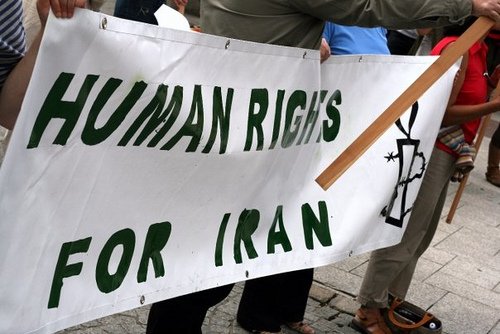See also Iran Feature: Criticising President Ahmadinejad...with 11th-Century Poetry
Friday's Iran Live Coverage: Supreme Leader Strikes a Defiant Pose
 2000 GMT: Threat of the Day. Alaeddin Boroujerdi, the head of Parliament's National Security Commission, has repeated the Supreme Leader's warning that Israeli cities will be destroyed if West Jerusalem attacks Iran: “Although the Zionist lobbies are exerting great influence on the US administration, the (Israeli) regime will have no power of its own in the absence of the US support."
2000 GMT: Threat of the Day. Alaeddin Boroujerdi, the head of Parliament's National Security Commission, has repeated the Supreme Leader's warning that Israeli cities will be destroyed if West Jerusalem attacks Iran: “Although the Zionist lobbies are exerting great influence on the US administration, the (Israeli) regime will have no power of its own in the absence of the US support."
Ayatollah Khamenei used a New Year's address on Thursday to warn that Haifa and Tel Aviv would be "annihilated" following any Israeli military action against the Islamic Republic.
1800 GMT: Eleection Watch. The "2+1" committee, seeking a candidate for June's Presidential election, has declared that there is an unprecedented unity of "hard-line" currents. It said this will fight sedition, the "deviant current" --- a label used for unacceptable elements within the regime --- and corruption.
The committee --- consisting of the Supreme Leader's advisor Ali Akbar Velayati, Tehran Mayor Mohammad-Baqer Qalibaf, and leading MP Gholam Ali Haddad Adel and backed by the Supreme Leader --- is looking for a single choice for the Presidency but has faced the challenge of the Ahmadinejad camp and a spate of declarations of candidacy by conservative figures.
1100 GMT: Military Watch. It looks like the Iranian military --- in part because of the Syrian conflict --- has been rattled by Friday's news of a reconciliation between Israel and Turkey.
Amid President Obama's trip to Israel, Prime Minister Benjamin Netanyahu apologised to Ankara for the killing of nine Turkish citizens aboard the Gaza Freedom Flotilla in May 2010, paving the way for restoration of diplomatic relations --- and for behind-the-scenes co-operation on intervention in Syria.
Brigadier General Masoud Jazayeri, the deputy head of Iran's armed forces, warned:
Under the current circumstances, the global arrogance mainly moves to find a replacement for the Islamic Republic of Iran in the Muslim world and the elite of the Muslim world should remain vigilant and pay necessary heed to the issue and do not allow the Americans and their allies to humiliate public opinion.
Jazayeri, in another jab at Turkey, said that the US and Britain were trying to replace pure Islam with “American Islam”.
1030 GMT: Surveillance Watch. Joanna Paraszczuk reports....
The Pupils' Association News Agency --- part of the Ministry of Education --- posts a press release from the Ministry of Intelligence with a set of 23 instructions, including a warning to Iranians to beware of "foreigners".
The Ministry's announcement --- highlighting an increased level of caution and concern about Western influence ahead of June's Presidential elections --- includes a sub-section "Working With the Police and Security Agencies Is Public Culture", advising that Iranians should cooperate with these agencies just like Europeans do.
The announcement also said Iranians should ask any "suspicious" officials to show documentation.
Paragraph 17 of the instructions tells Iranians that if they receive an offer to work with the "enemy" they should inform the Intelligence Ministry. "This act indicates your love of the homeland, health, and your loyalty," the Ministry writes.
Paragraphs 20 through 22 advise Iranians not to spread or believe "foreign" media's "rumours".
1020 GMT: Interrogation Watch. The wife of Kurdish labour activist Ghaleb Hosseini has been arrested and interrogated for several hours.
0650 GMT: Human Rights Watch. The United Nations Human Rights Council, by a 26-2 vote, has agreed to extend the mandate for another year of the Special Rapporteur on Human Rights in Iran, Ahmed Shaheed.
There were 17 abstentions.
On 11 March, Shaheed produced his latest report documenting repression, detentions, and executions, based on documents and interviews with Iranians outside the country and with those inside whom he could contact by phone and video. The Iranian regime has never allowed him to enter the Islamic Republic to carry out enquiries.
The Iranian envoy, Mohammad Reza Sajjadi, rejected the decision as "substantially flawed" and said it was aimed at the "short-sighted political interests of a few countries".